Unit 12 Life is full of the unexpected.Section A2 (3a-3c)优学案(含答案)
文档属性
| 名称 | Unit 12 Life is full of the unexpected.Section A2 (3a-3c)优学案(含答案) | 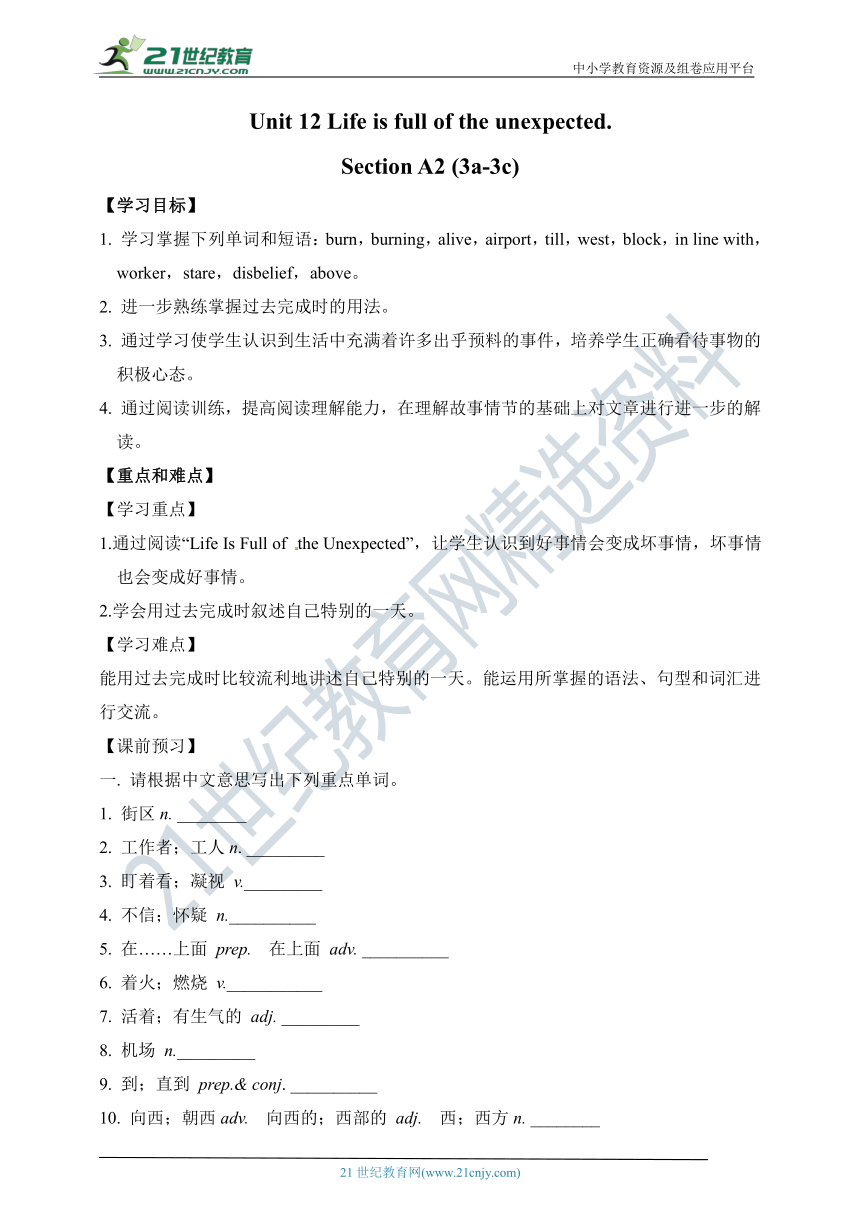 | |
| 格式 | zip | ||
| 文件大小 | 1.1MB | ||
| 资源类型 | 试卷 | ||
| 版本资源 | 人教新目标(Go for it)版 | ||
| 科目 | 英语 | ||
| 更新时间 | 2019-08-14 11:28:23 | ||
图片预览

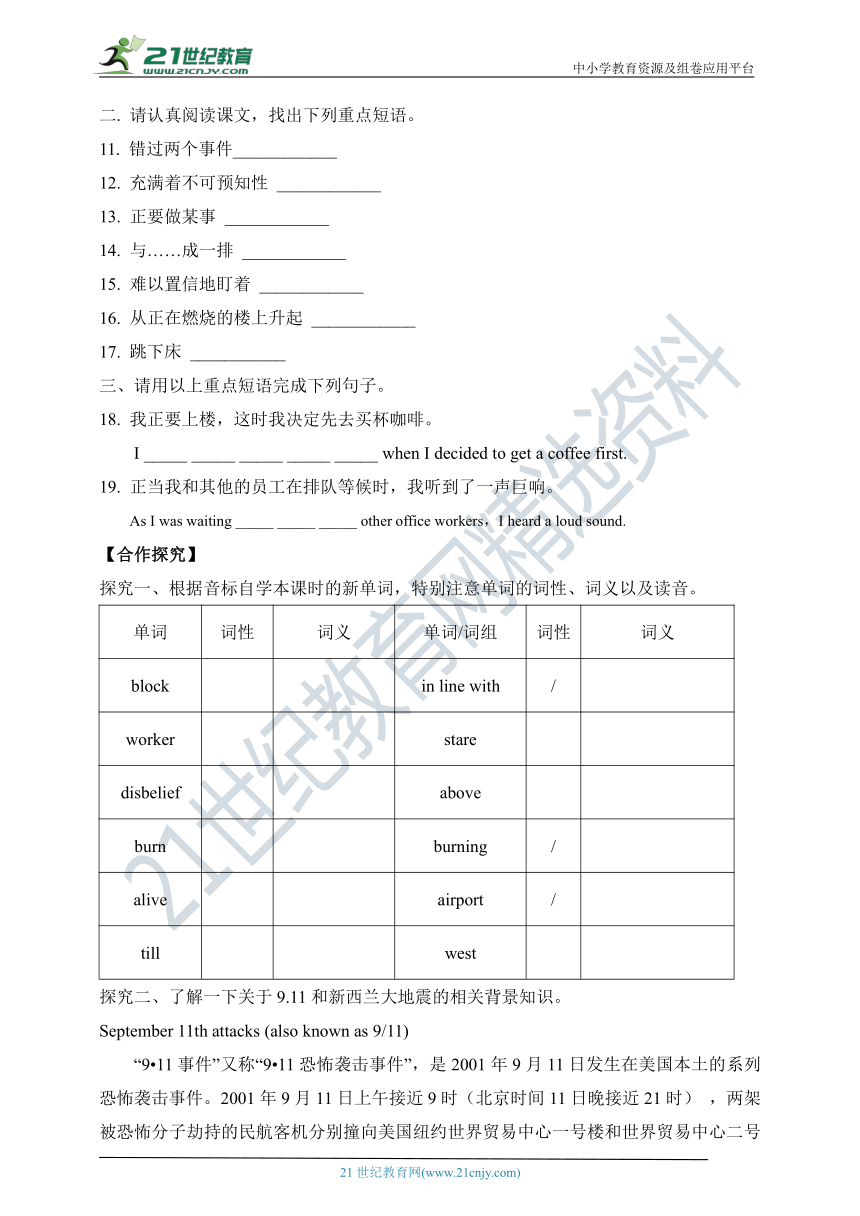
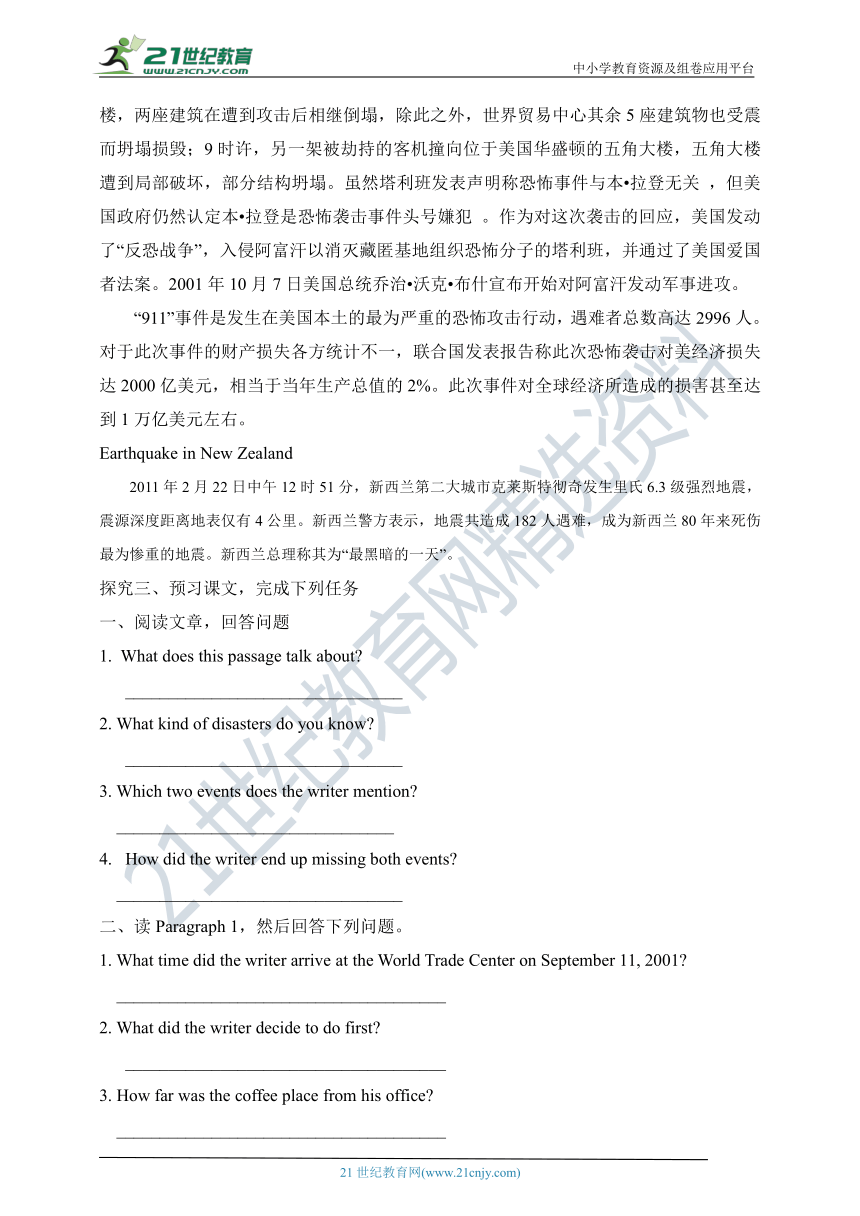
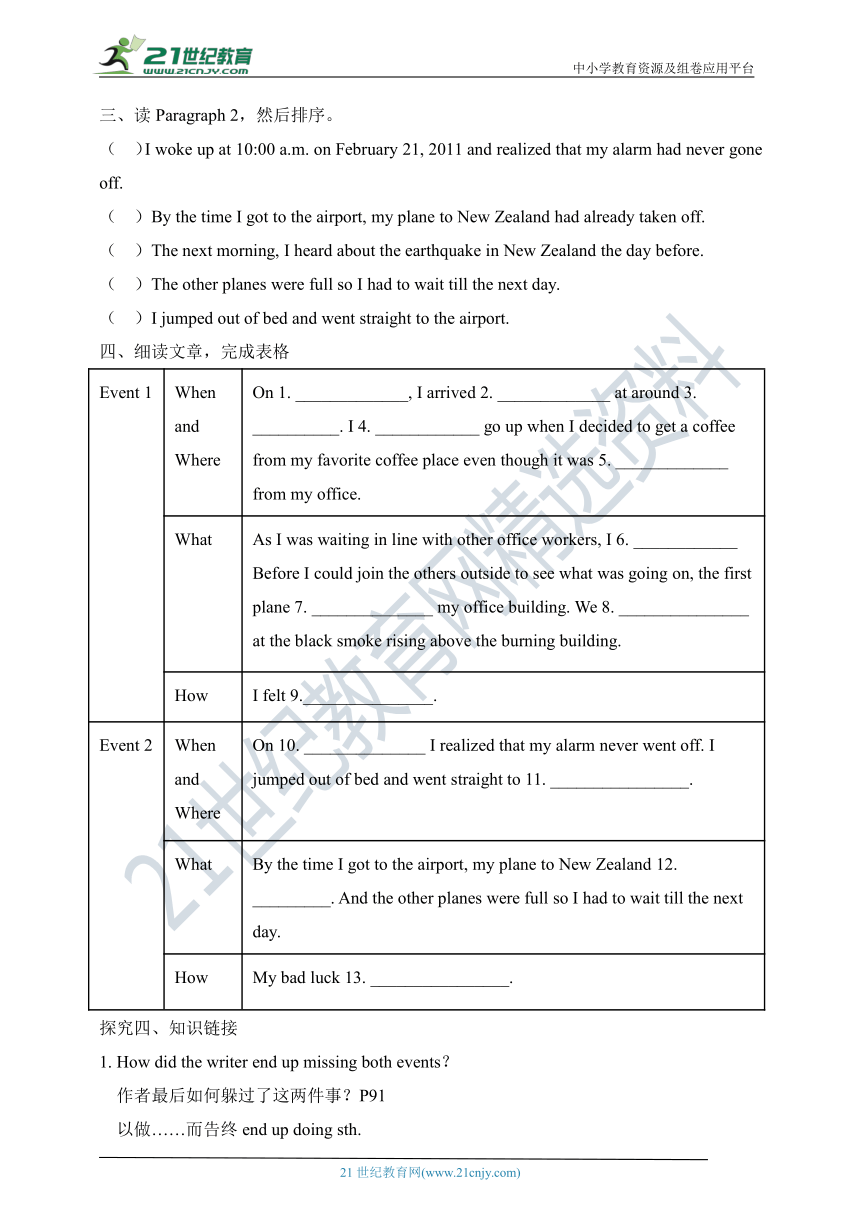
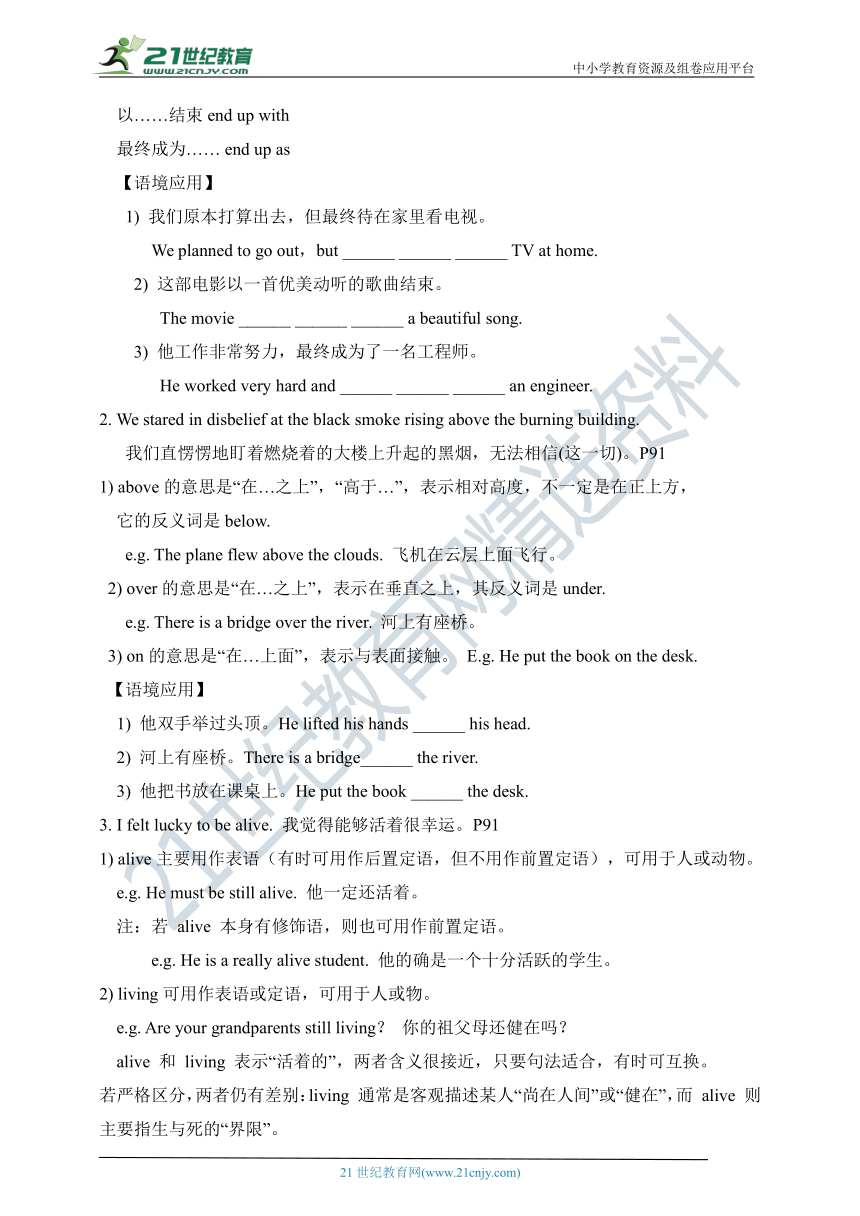
文档简介
Unit 12 Life is full of the unexpected.
Section A2 (3a-3c)
【学习目标】
1. 学习掌握下列单词和短语:burn,burning,alive,airport,till,west,block,in line with,worker,stare,disbelief,above。
2. 进一步熟练掌握过去完成时的用法。
3. 通过学习使学生认识到生活中充满着许多出乎预料的事件,培养学生正确看待事物的积极心态。
4. 通过阅读训练,提高阅读理解能力,在理解故事情节的基础上对文章进行进一步的解读。
【重点和难点】
【学习重点】
1.通过阅读“Life Is Full of the Unexpected”,让学生认识到好事情会变成坏事情,坏事情也会变成好事情。
2.学会用过去完成时叙述自己特别的一天。
【学习难点】
能用过去完成时比较流利地讲述自己特别的一天。能运用所掌握的语法、句型和词汇进行交流。
【课前预习】
一. 请根据中文意思写出下列重点单词。
1. 街区n. ________
2. 工作者;工人n. _________
3. 盯着看;凝视 v._________
4. 不信;怀疑 n.__________
5. 在……上面 prep. 在上面 adv. __________
6. 着火;燃烧 v.___________
7. 活着;有生气的 adj. _________
8. 机场 n._________
9. 到;直到 prep.& conj. __________
10. 向西;朝西adv. 向西的;西部的 adj. 西;西方n. ________
二. 请认真阅读课文,找出下列重点短语。
11. 错过两个事件____________
12. 充满着不可预知性 ____________
13. 正要做某事 ____________
14. 与……成一排 ____________
15. 难以置信地盯着 ____________
16. 从正在燃烧的楼上升起 ____________
17. 跳下床 ___________
三、请用以上重点短语完成下列句子。
18. 我正要上楼,这时我决定先去买杯咖啡。
I _____ _____ _____ _____ _____ when I decided to get a coffee first.
19. 正当我和其他的员工在排队等候时,我听到了一声巨响。
As I was waiting _____ _____ _____ other office workers,I heard a loud sound.
【合作探究】
探究一、根据音标自学本课时的新单词,特别注意单词的词性、词义以及读音。
单词
词性
词义
单词/词组
词性
词义
block
in line with
/
worker
stare
disbelief
above
burn
burning
/
alive
airport
/
till
west
探究二、了解一下关于9.11和新西兰大地震的相关背景知识。
September 11th attacks (also known as 9/11)
“9?11事件”又称“9?11恐怖袭击事件”,是2001年9月11日发生在美国本土的系列恐怖袭击事件。2001年9月11日上午接近9时(北京时间11日晚接近21时) ,两架被恐怖分子劫持的民航客机分别撞向美国纽约世界贸易中心一号楼和世界贸易中心二号楼,两座建筑在遭到攻击后相继倒塌,除此之外,世界贸易中心其余5座建筑物也受震而坍塌损毁;9时许,另一架被劫持的客机撞向位于美国华盛顿的五角大楼,五角大楼遭到局部破坏,部分结构坍塌。虽然塔利班发表声明称恐怖事件与本?拉登无关 ,但美国政府仍然认定本?拉登是恐怖袭击事件头号嫌犯 。作为对这次袭击的回应,美国发动了“反恐战争”,入侵阿富汗以消灭藏匿基地组织恐怖分子的塔利班,并通过了美国爱国者法案。2001年10月7日美国总统乔治?沃克?布什宣布开始对阿富汗发动军事进攻。
“911”事件是发生在美国本土的最为严重的恐怖攻击行动,遇难者总数高达2996人。对于此次事件的财产损失各方统计不一,联合国发表报告称此次恐怖袭击对美经济损失达2000亿美元,相当于当年生产总值的2%。此次事件对全球经济所造成的损害甚至达到1万亿美元左右。
Earthquake in New Zealand
2011年2月22日中午12时51分,新西兰第二大城市克莱斯特彻奇发生里氏6.3级强烈地震,震源深度距离地表仅有4公里。新西兰警方表示,地震共造成182人遇难,成为新西兰80年来死伤最为惨重的地震。新西兰总理称其为“最黑暗的一天”。
探究三、预习课文,完成下列任务
阅读文章,回答问题
What does this passage talk about?
________________________________
2. What kind of disasters do you know?
________________________________
3. Which two events does the writer mention?
________________________________
How did the writer end up missing both events?
_________________________________
二、读Paragraph 1,然后回答下列问题。
1. What time did the writer arrive at the World Trade Center on September 11, 2001?
______________________________________
2. What did the writer decide to do first?
_____________________________________
3. How far was the coffee place from his office?
______________________________________
三、读Paragraph 2,然后排序。
( )I woke up at 10:00 a.m. on February 21, 2011 and realized that my alarm had never gone off.
( )By the time I got to the airport, my plane to New Zealand had already taken off.
( )The next morning, I heard about the earthquake in New Zealand the day before.
( )The other planes were full so I had to wait till the next day.
( )I jumped out of bed and went straight to the airport.
四、细读文章,完成表格
Event 1
When
and
Where
On 1. _____________, I arrived 2. _____________ at around 3. __________. I 4. ____________ go up when I decided to get a coffee from my favorite coffee place even though it was 5. _____________ from my office.
What
As I was waiting in line with other office workers, I 6. ____________ Before I could join the others outside to see what was going on, the first plane 7. ______________ my office building. We 8. _______________ at the black smoke rising above the burning building.
How
I felt 9._______________.
Event 2
When
and
Where
On 10. ______________ I realized that my alarm never went off. I jumped out of bed and went straight to 11. ________________.
What
By the time I got to the airport, my plane to New Zealand 12. _________. And the other planes were full so I had to wait till the next day.
How
My bad luck 13. ________________.
探究四、知识链接
1. How did the writer end up missing both events?
作者最后如何躲过了这两件事?P91
以做……而告终end up doing sth.
以……结束end up with
最终成为…… end up as
【语境应用】
1) 我们原本打算出去,但最终待在家里看电视。
We planned to go out,but ______ ______ ______ TV at home.
2) 这部电影以一首优美动听的歌曲结束。
The movie ______ ______ ______ a beautiful song.
3) 他工作非常努力,最终成为了一名工程师。
He worked very hard and ______ ______ ______ an engineer.
2. We stared in disbelief at the black smoke rising above the burning building.
我们直愣愣地盯着燃烧着的大楼上升起的黑烟,无法相信(这一切)。P91
1) above的意思是“在…之上”,“高于…”,表示相对高度,不一定是在正上方,
它的反义词是below.
e.g. The plane flew above the clouds. 飞机在云层上面飞行。
2) over的意思是“在…之上”,表示在垂直之上,其反义词是under.
e.g. There is a bridge over the river. 河上有座桥。
3) on的意思是“在…上面”,表示与表面接触。 E.g. He put the book on the desk.
【语境应用】
1) 他双手举过头顶。He lifted his hands ______ his head.
2) 河上有座桥。There is a bridge______ the river.
3) 他把书放在课桌上。He put the book ______ the desk.
3. I felt lucky to be alive. 我觉得能够活着很幸运。P91
1) alive主要用作表语(有时可用作后置定语,但不用作前置定语),可用于人或动物。e.g. He must be still alive. 他一定还活着。
注:若 alive 本身有修饰语,则也可用作前置定语。
e.g. He is a really alive student. 他的确是一个十分活跃的学生。
2) living可用作表语或定语,可用于人或物。
e.g. Are your grandparents still living? 你的祖父母还健在吗?
alive 和 living 表示“活着的”,两者含义很接近,只要句法适合,有时可互换。
若严格区分,两者仍有差别:living 通常是客观描述某人“尚在人间”或“健在”,而 alive 则主要指生与死的“界限”。
e.g. He was still alive when I reached the hospital. 当我赶到医院时他还活着。
3) live 通常只用作定语(前置),可用于动物或植物,但一般不用于人。如:
He bought some live fish. 他买了几条活鱼。
【语境应用】
1) 他是当今在世的最伟大的艺术家之一。
He is one of the greatest artists ______ today.
2) 一切生物都需要水。All ______ things need water.
3) 他说他见过活鲸鱼。He said he had seen a ______ whale.
【课时小结】
重点单词
1. block (n.) 街区
2. worker (n.) 工作者;工人
3. stare (v.) 盯着看;凝视
4. disbelief (n.) 不信;怀疑
5. above (adv.) 在上面 (prep.) 在……上面
6. burn (v.) 着火;燃烧
7. alive (adj.) 活着的;有生气的
8. airport (n.) 机场
9. till (conj.& prep.) 到;直到
10. west (adv.) 向西;朝西 (adj.) 向西的;西部的 (n.) 西;西方
重点词组
1. miss both events 错过两个事件
2. full of unexpected充满着不可预知性
3. be about to do sth. 正要做某事
4. stare in disbelief at 难以置信地盯着
5. raise above the burning building 从正在燃烧的楼上升起
6. jump out of bed 跳下床
重点句式
1. I was about to go up when I decided to get a coffee first.
2. As I was waiting in line with other office workers, I heard a loud sound.
3. Before I could join the others outside to see what was going on, the first plane had
already hit my office building.
4. But by the time I got to the airport, my plane to New Zealand had already taken off.
5. My bad luck had unexpectedly turned into a good thing.
【达标检测】
一 . 根据句意及所给首字母提示,补全句中所缺单词。 1. Sally’s uncle is a w . He works in a car factory. 2. When he arrived, he found a bright fire was b . 3. My flight will reach Taiyuan Wusu International A at 7: 40 p.m. 4. James lived with his parents t he was twenty-five. 5. Eric, is the snake a or dead? 二.根据句意,从方框中选择恰当的单词或短语填空,有的需要变换形式。
in line with, show up, full of, be about to, turn into,
arrive at, stare at, workday
1. A ______________ is a day on which people go to work. 2. Soon the rain stopped and it _____________ an sunny day.
3. Linda, can you ______________ the bus stop at 9:00 a.m.? 4. It’s rude to _______________ other people. Don’t do like that again. 5. Mr. Xiao _______________ leave when he heard a knock on the door. 6. Lucy stood ______________ other students until the teacher said they could leave. 7. His speech was ______________ jokes. People laughed from time to time. 8. I invited him for 8 o’clock, but he didn’t _______________until 9:30.
三. 用括号内单词的适当形式填空。 1. Dennis ________(study) English for four years before he went to the USA. 2. Wu Dong’s parents ________(not have) any news about him for three months until
he ________(call)them yesterday. 3. By the time I _______ (get) home last week, my father ________ (leave) for New
York. 4. He said that he _______ (learn) some French before he was 10 years old.
四. 单项选择。
( ) 1.—Is Mount Tai the highest mountain in Shandong? —I think so. It is 1,545 meters ________ sea level. A. under?? B. above?? C. past??? D. along
( )2. How I wish I could sleep until noon!However,I had to get up as soon as the
alarm clock ________. A. took off? B. went off ? C. went away? D. took away
( )3. I told Johnson the poem was written by me. However, after hearing this, he
stared at me ________. A. in common? B. in danger C. in person? D. in disbelief
( )4. A?bad?thing?can?be?_______??a?good?one?sometimes.
A.?run into ??? B.?looked into?? C.?turned into D.?got into
( )5. I?don’t?like?vegetables?_______?they?are?good?for?my?health.?
? ?A.?because?? B.?even?though C.?after?all? ?D.?so?that?
【自我评价】
1. 本课我学会了什么?
_________________________________________________________
2. 通过本课的学习,我还有哪些疑问?
_____________________________________________________
参考答案:
【课前预习】
1. block 2. worker 3. stare 4. disbelief 5. above 6. burn
7. alive 8. airport 9. till 10. west
11. miss both events 12. full of the unexpected 13. be about to do sth.
14. in line with 15. stare in disbelief at
16. raise above the burning building 17. jump out of bed
18. was about to go up 19. in line with
探究一
单词
词性
词义
单词/词组
词性
词义
block
n
街区
in line with
/
与……成一排
worker
n
工作者;工人
stare
v
盯着看;凝视
disbelief
n
不信;怀疑
above
prep/
adv
在……上面prep. 在上面adv.
burn
v
着火;燃烧
burning
/
alive
adj
活着;有生气的
airport
n
机场
till
prep.& conj
到;直到
west
adj & adv & n
向西;朝西adv. 向西的;西部的adj. 西;西方n.
探究二
一、
1. It talks about the writer’s two unexpected experiences.
2. Earthquakes, storms, aircraft crashes, oil spill, nuclear disaster, terrorist attack, virus and so on.
3. The writer mentions the September 11 attack in New York and the earthquake in New Zealand.
4. The writer went to get a coffee first and was not in the office when the plane hit the World Trade Center. He/she had overslept and missed his/her flight, so he/she was able to avoid the earthquake.
二
1. He arrived at the building at around 8:30 a.m.
2. He decided to get a coffee first.
3. It was two blocks east from his office.
三 13542
四、
1. September 11, 2001
2. at my building
3. 8:30 a.m
4. was about to
5. two blocks east
6. heard a loud sound
7. had already hit
8. stared in disbelief
9. lucky to be alive
10. February 21, 2011
11. the airport
12. had already taken off
13. had unexpectedly turned into a good thing
探究四
1. 1) ended up watching 2) ends up with 3) ended up as
2. 1) above 2) over 3) on;
3. 1) alive 2) living 3) live
【达标检测】
一 1. worker 2. burning 3. Airport 4. till 5. alive
二1. workday 2. turned into 3. arrive at 4. stare at 5. was about to
6. in line with 7. full of 8. show up
三. 1. had studied 2. hadn’t had; called 3. got; had left 4. had learned
四1-5 BBDCB
Section A2 (3a-3c)
【学习目标】
1. 学习掌握下列单词和短语:burn,burning,alive,airport,till,west,block,in line with,worker,stare,disbelief,above。
2. 进一步熟练掌握过去完成时的用法。
3. 通过学习使学生认识到生活中充满着许多出乎预料的事件,培养学生正确看待事物的积极心态。
4. 通过阅读训练,提高阅读理解能力,在理解故事情节的基础上对文章进行进一步的解读。
【重点和难点】
【学习重点】
1.通过阅读“Life Is Full of the Unexpected”,让学生认识到好事情会变成坏事情,坏事情也会变成好事情。
2.学会用过去完成时叙述自己特别的一天。
【学习难点】
能用过去完成时比较流利地讲述自己特别的一天。能运用所掌握的语法、句型和词汇进行交流。
【课前预习】
一. 请根据中文意思写出下列重点单词。
1. 街区n. ________
2. 工作者;工人n. _________
3. 盯着看;凝视 v._________
4. 不信;怀疑 n.__________
5. 在……上面 prep. 在上面 adv. __________
6. 着火;燃烧 v.___________
7. 活着;有生气的 adj. _________
8. 机场 n._________
9. 到;直到 prep.& conj. __________
10. 向西;朝西adv. 向西的;西部的 adj. 西;西方n. ________
二. 请认真阅读课文,找出下列重点短语。
11. 错过两个事件____________
12. 充满着不可预知性 ____________
13. 正要做某事 ____________
14. 与……成一排 ____________
15. 难以置信地盯着 ____________
16. 从正在燃烧的楼上升起 ____________
17. 跳下床 ___________
三、请用以上重点短语完成下列句子。
18. 我正要上楼,这时我决定先去买杯咖啡。
I _____ _____ _____ _____ _____ when I decided to get a coffee first.
19. 正当我和其他的员工在排队等候时,我听到了一声巨响。
As I was waiting _____ _____ _____ other office workers,I heard a loud sound.
【合作探究】
探究一、根据音标自学本课时的新单词,特别注意单词的词性、词义以及读音。
单词
词性
词义
单词/词组
词性
词义
block
in line with
/
worker
stare
disbelief
above
burn
burning
/
alive
airport
/
till
west
探究二、了解一下关于9.11和新西兰大地震的相关背景知识。
September 11th attacks (also known as 9/11)
“9?11事件”又称“9?11恐怖袭击事件”,是2001年9月11日发生在美国本土的系列恐怖袭击事件。2001年9月11日上午接近9时(北京时间11日晚接近21时) ,两架被恐怖分子劫持的民航客机分别撞向美国纽约世界贸易中心一号楼和世界贸易中心二号楼,两座建筑在遭到攻击后相继倒塌,除此之外,世界贸易中心其余5座建筑物也受震而坍塌损毁;9时许,另一架被劫持的客机撞向位于美国华盛顿的五角大楼,五角大楼遭到局部破坏,部分结构坍塌。虽然塔利班发表声明称恐怖事件与本?拉登无关 ,但美国政府仍然认定本?拉登是恐怖袭击事件头号嫌犯 。作为对这次袭击的回应,美国发动了“反恐战争”,入侵阿富汗以消灭藏匿基地组织恐怖分子的塔利班,并通过了美国爱国者法案。2001年10月7日美国总统乔治?沃克?布什宣布开始对阿富汗发动军事进攻。
“911”事件是发生在美国本土的最为严重的恐怖攻击行动,遇难者总数高达2996人。对于此次事件的财产损失各方统计不一,联合国发表报告称此次恐怖袭击对美经济损失达2000亿美元,相当于当年生产总值的2%。此次事件对全球经济所造成的损害甚至达到1万亿美元左右。
Earthquake in New Zealand
2011年2月22日中午12时51分,新西兰第二大城市克莱斯特彻奇发生里氏6.3级强烈地震,震源深度距离地表仅有4公里。新西兰警方表示,地震共造成182人遇难,成为新西兰80年来死伤最为惨重的地震。新西兰总理称其为“最黑暗的一天”。
探究三、预习课文,完成下列任务
阅读文章,回答问题
What does this passage talk about?
________________________________
2. What kind of disasters do you know?
________________________________
3. Which two events does the writer mention?
________________________________
How did the writer end up missing both events?
_________________________________
二、读Paragraph 1,然后回答下列问题。
1. What time did the writer arrive at the World Trade Center on September 11, 2001?
______________________________________
2. What did the writer decide to do first?
_____________________________________
3. How far was the coffee place from his office?
______________________________________
三、读Paragraph 2,然后排序。
( )I woke up at 10:00 a.m. on February 21, 2011 and realized that my alarm had never gone off.
( )By the time I got to the airport, my plane to New Zealand had already taken off.
( )The next morning, I heard about the earthquake in New Zealand the day before.
( )The other planes were full so I had to wait till the next day.
( )I jumped out of bed and went straight to the airport.
四、细读文章,完成表格
Event 1
When
and
Where
On 1. _____________, I arrived 2. _____________ at around 3. __________. I 4. ____________ go up when I decided to get a coffee from my favorite coffee place even though it was 5. _____________ from my office.
What
As I was waiting in line with other office workers, I 6. ____________ Before I could join the others outside to see what was going on, the first plane 7. ______________ my office building. We 8. _______________ at the black smoke rising above the burning building.
How
I felt 9._______________.
Event 2
When
and
Where
On 10. ______________ I realized that my alarm never went off. I jumped out of bed and went straight to 11. ________________.
What
By the time I got to the airport, my plane to New Zealand 12. _________. And the other planes were full so I had to wait till the next day.
How
My bad luck 13. ________________.
探究四、知识链接
1. How did the writer end up missing both events?
作者最后如何躲过了这两件事?P91
以做……而告终end up doing sth.
以……结束end up with
最终成为…… end up as
【语境应用】
1) 我们原本打算出去,但最终待在家里看电视。
We planned to go out,but ______ ______ ______ TV at home.
2) 这部电影以一首优美动听的歌曲结束。
The movie ______ ______ ______ a beautiful song.
3) 他工作非常努力,最终成为了一名工程师。
He worked very hard and ______ ______ ______ an engineer.
2. We stared in disbelief at the black smoke rising above the burning building.
我们直愣愣地盯着燃烧着的大楼上升起的黑烟,无法相信(这一切)。P91
1) above的意思是“在…之上”,“高于…”,表示相对高度,不一定是在正上方,
它的反义词是below.
e.g. The plane flew above the clouds. 飞机在云层上面飞行。
2) over的意思是“在…之上”,表示在垂直之上,其反义词是under.
e.g. There is a bridge over the river. 河上有座桥。
3) on的意思是“在…上面”,表示与表面接触。 E.g. He put the book on the desk.
【语境应用】
1) 他双手举过头顶。He lifted his hands ______ his head.
2) 河上有座桥。There is a bridge______ the river.
3) 他把书放在课桌上。He put the book ______ the desk.
3. I felt lucky to be alive. 我觉得能够活着很幸运。P91
1) alive主要用作表语(有时可用作后置定语,但不用作前置定语),可用于人或动物。e.g. He must be still alive. 他一定还活着。
注:若 alive 本身有修饰语,则也可用作前置定语。
e.g. He is a really alive student. 他的确是一个十分活跃的学生。
2) living可用作表语或定语,可用于人或物。
e.g. Are your grandparents still living? 你的祖父母还健在吗?
alive 和 living 表示“活着的”,两者含义很接近,只要句法适合,有时可互换。
若严格区分,两者仍有差别:living 通常是客观描述某人“尚在人间”或“健在”,而 alive 则主要指生与死的“界限”。
e.g. He was still alive when I reached the hospital. 当我赶到医院时他还活着。
3) live 通常只用作定语(前置),可用于动物或植物,但一般不用于人。如:
He bought some live fish. 他买了几条活鱼。
【语境应用】
1) 他是当今在世的最伟大的艺术家之一。
He is one of the greatest artists ______ today.
2) 一切生物都需要水。All ______ things need water.
3) 他说他见过活鲸鱼。He said he had seen a ______ whale.
【课时小结】
重点单词
1. block (n.) 街区
2. worker (n.) 工作者;工人
3. stare (v.) 盯着看;凝视
4. disbelief (n.) 不信;怀疑
5. above (adv.) 在上面 (prep.) 在……上面
6. burn (v.) 着火;燃烧
7. alive (adj.) 活着的;有生气的
8. airport (n.) 机场
9. till (conj.& prep.) 到;直到
10. west (adv.) 向西;朝西 (adj.) 向西的;西部的 (n.) 西;西方
重点词组
1. miss both events 错过两个事件
2. full of unexpected充满着不可预知性
3. be about to do sth. 正要做某事
4. stare in disbelief at 难以置信地盯着
5. raise above the burning building 从正在燃烧的楼上升起
6. jump out of bed 跳下床
重点句式
1. I was about to go up when I decided to get a coffee first.
2. As I was waiting in line with other office workers, I heard a loud sound.
3. Before I could join the others outside to see what was going on, the first plane had
already hit my office building.
4. But by the time I got to the airport, my plane to New Zealand had already taken off.
5. My bad luck had unexpectedly turned into a good thing.
【达标检测】
一 . 根据句意及所给首字母提示,补全句中所缺单词。 1. Sally’s uncle is a w . He works in a car factory. 2. When he arrived, he found a bright fire was b . 3. My flight will reach Taiyuan Wusu International A at 7: 40 p.m. 4. James lived with his parents t he was twenty-five. 5. Eric, is the snake a or dead? 二.根据句意,从方框中选择恰当的单词或短语填空,有的需要变换形式。
in line with, show up, full of, be about to, turn into,
arrive at, stare at, workday
1. A ______________ is a day on which people go to work. 2. Soon the rain stopped and it _____________ an sunny day.
3. Linda, can you ______________ the bus stop at 9:00 a.m.? 4. It’s rude to _______________ other people. Don’t do like that again. 5. Mr. Xiao _______________ leave when he heard a knock on the door. 6. Lucy stood ______________ other students until the teacher said they could leave. 7. His speech was ______________ jokes. People laughed from time to time. 8. I invited him for 8 o’clock, but he didn’t _______________until 9:30.
三. 用括号内单词的适当形式填空。 1. Dennis ________(study) English for four years before he went to the USA. 2. Wu Dong’s parents ________(not have) any news about him for three months until
he ________(call)them yesterday. 3. By the time I _______ (get) home last week, my father ________ (leave) for New
York. 4. He said that he _______ (learn) some French before he was 10 years old.
四. 单项选择。
( ) 1.—Is Mount Tai the highest mountain in Shandong? —I think so. It is 1,545 meters ________ sea level. A. under?? B. above?? C. past??? D. along
( )2. How I wish I could sleep until noon!However,I had to get up as soon as the
alarm clock ________. A. took off? B. went off ? C. went away? D. took away
( )3. I told Johnson the poem was written by me. However, after hearing this, he
stared at me ________. A. in common? B. in danger C. in person? D. in disbelief
( )4. A?bad?thing?can?be?_______??a?good?one?sometimes.
A.?run into ??? B.?looked into?? C.?turned into D.?got into
( )5. I?don’t?like?vegetables?_______?they?are?good?for?my?health.?
? ?A.?because?? B.?even?though C.?after?all? ?D.?so?that?
【自我评价】
1. 本课我学会了什么?
_________________________________________________________
2. 通过本课的学习,我还有哪些疑问?
_____________________________________________________
参考答案:
【课前预习】
1. block 2. worker 3. stare 4. disbelief 5. above 6. burn
7. alive 8. airport 9. till 10. west
11. miss both events 12. full of the unexpected 13. be about to do sth.
14. in line with 15. stare in disbelief at
16. raise above the burning building 17. jump out of bed
18. was about to go up 19. in line with
探究一
单词
词性
词义
单词/词组
词性
词义
block
n
街区
in line with
/
与……成一排
worker
n
工作者;工人
stare
v
盯着看;凝视
disbelief
n
不信;怀疑
above
prep/
adv
在……上面prep. 在上面adv.
burn
v
着火;燃烧
burning
/
alive
adj
活着;有生气的
airport
n
机场
till
prep.& conj
到;直到
west
adj & adv & n
向西;朝西adv. 向西的;西部的adj. 西;西方n.
探究二
一、
1. It talks about the writer’s two unexpected experiences.
2. Earthquakes, storms, aircraft crashes, oil spill, nuclear disaster, terrorist attack, virus and so on.
3. The writer mentions the September 11 attack in New York and the earthquake in New Zealand.
4. The writer went to get a coffee first and was not in the office when the plane hit the World Trade Center. He/she had overslept and missed his/her flight, so he/she was able to avoid the earthquake.
二
1. He arrived at the building at around 8:30 a.m.
2. He decided to get a coffee first.
3. It was two blocks east from his office.
三 13542
四、
1. September 11, 2001
2. at my building
3. 8:30 a.m
4. was about to
5. two blocks east
6. heard a loud sound
7. had already hit
8. stared in disbelief
9. lucky to be alive
10. February 21, 2011
11. the airport
12. had already taken off
13. had unexpectedly turned into a good thing
探究四
1. 1) ended up watching 2) ends up with 3) ended up as
2. 1) above 2) over 3) on;
3. 1) alive 2) living 3) live
【达标检测】
一 1. worker 2. burning 3. Airport 4. till 5. alive
二1. workday 2. turned into 3. arrive at 4. stare at 5. was about to
6. in line with 7. full of 8. show up
三. 1. had studied 2. hadn’t had; called 3. got; had left 4. had learned
四1-5 BBDCB
同课章节目录
- Unit 1 How can we become good learners.
- Section A
- Section B
- Unit 2 I think that mooncakes are delicious!
- Section A
- Section B
- Unit 3 Could you please tell me where the restroom
- Section A
- Section B
- Unit 4 I used to be afraid of the dark.
- Section A
- Section B
- Unit 5 What are the shirts made of?
- Section A
- Section B
- Review of Units 1-5
- Unit 6 When was it invented?
- Section A
- Section B
- Unit 7 Teenagers should be allowed to choose their
- Section A
- Section B
- Unit 8 It must belong to Carla.
- Section A
- Section B
- Unit 9 I like music that I can dance to.
- Section A
- Section B
- Unit 10 You're supposed to shake hands.
- Section A
- Section B
- Review of Units 6-10
- Unit 11 Sad movies make me cry.
- Section A
- Section B
- Unit 12 Life is full of the unexpected
- Section A
- Section B
- Unit 13 We're trying to save the earth!
- Section A
- Section B
- Unit 14 I remember meeting all of you in Grade 7.
- Section A
- Section B
- Review of Units 11-14
